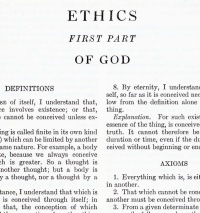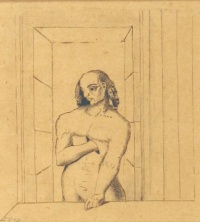Philosophy
From The Art and Popular Culture Encyclopedia

Plato (left) and Aristotle (right), a detail of The School of Athens, a fresco by Raphael. Aristotle gestures to the earth, representing his belief in knowledge through empirical observation and experience, while holding a copy of his Nicomachean Ethics in his hand. Plato holds his Timaeus and gestures to the heavens, representing his belief in The Forms

By virtue of his magnum opus, the posthumous Ethics, Spinoza is considered one of Western philosophy's definitive ethicists.

Inversions, the first French gay journal is published. Produced between 1924 and 1926, it stopped publication after the French government charged the publishers with "Outrage aux bonnes mœurs". Its full title was Inversions ... in art, literature, philosophy and science.

The heart has its reasons, of which reason knows nothing (c.1887) by Odilon Redon, a phrase from the Pensées (1669) by Blaise Pascal
|
Related e |
|
Featured: |
- "Nothing is more usual than for philosophers to encroach on the province of grammarians." - David Hume
Philosophy is the discipline concerned with questions of how one should live (ethics); what sorts of things exist and what are their essential natures (metaphysics); what counts as genuine knowledge (epistemology); and what are the correct principles of reasoning (logic).
Contents |
History
Many societies have considered philosophical questions and built philosophical traditions based upon each other's works.
Eastern philosophy is organized by the chronological periods of each region. Historians of western philosophy usually divide the subject into three or more periods, the most important being ancient philosophy, medieval philosophy, and modern philosophy.
See also
- Anti-philosophy
- 19th century philosophy
- 20th century philosophy
- Continental philosophy
- Map–territory relation
- General economy
- Desiring-production
- Twentieth-century French philosophy
- Theory
- Western philosophy
- Postmodern philosophy
- Haecceity
- Process philosophy
- Philosophy and literature
- Philosophy and film
- Embodied philosophy
- Toilet philosophy
- Kant and Sade: The Ideal Couple by Zizek
- Philosophy in the Bedroom by Sade
By field
- Philosophy of language
- Philosophy of laughter
- Philosophy of religion
- Philosophy of sex
- Philosophy of horror
See also
- Lists of philosophers
- List of philosophy journals
- Unsolved problems in philosophy
- Political philosophy
- Social theory
Unless indicated otherwise, the text in this article is either based on Wikipedia article "Philosophy" or another language Wikipedia page thereof used under the terms of the GNU Free Documentation License; or on research by Jahsonic and friends. See Art and Popular Culture's copyright notice.



